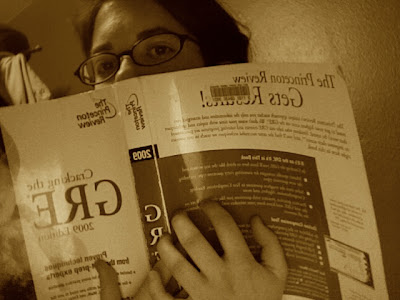this whole grad school thing is still a big if. a plan B. or at least a plan A.2... but still, it's an if I'm trying to happily work toward. so that means studying. it means filling my head with mathematical tricks and memorizing lots of vocabulary. and it means practice tests.
the verbal reasoning section doesn't worry me. I'm good at those.
and the analytical writing sections don't worry me. I'm good at those too, aren't I?
what worries me is the quantitative reasoning. math! I used to be good at math. really, I was once quite capable of doing math. but the last math class I was in was a tiny little 7 a.m. calculus III, way back in 2002. since then, my understanding of percentages and fractions and exponents has suffered severely damaging oxidation.
I have three and a half weeks to prepare for this silly exam. is that long enough? it will just have to be. I really don't want to pay another $50 to reschedule.

my plan is to study mainly math problems and vocabulary words, and take a full practice test every week before the actual test. somebody out there needs to be really proud of the thought that I--a person who never usually has to study for anything ever--have put into this schedule. I hope it all makes a difference.
the part I haven't really practiced at all yet--not even once in the whole year and a half I've been "studying for the GRE"--is the writing. I've been a bit lazy about that because... well, it's writing. it's what I love. but I should still practice. so here's where I ask you, my lovely little audience, for a little external motivation. here are the links to a bunch of sample questions which may appear on the analytical writing section of the GRE: first the Issues, and second the Arguments. I just need you to give me three of each. please? pick your favourites. scroll randomly and pick a few with your eyes closed. either way. let me know in the comments, and maybe I'll post some of my practice essays on the blog. we'll see.


3 comments:
Preparing for the GRE, especially so quickly, can be a daunting task! I teach GRE prep classes, and I've seen plenty of people--with the right motivation--achieve what you're looking for.
For the Quant section, remember that the GRE isn't so much a math test as a logical reasoning one, using some very basic (from looooong before Calc III!!!) math facts to challenge you to think at higher levels.
There are some really useful blog posts at http://www.kaptest.com/GRE/Explore-the-GRE/blogs.html that can help you with the Analytical Writing section (and the rest of the test, too). You write very well, so as long as you learn the right way to prepare and structure these essays, you should get a high score on them.
So there were a lot that sounded interesting, but I thought I'd go for some of the harder ones too. You've got to be prepared for them all, right?
Issues:
(1) "As long as people in a society are hungry or out of work or lack the basic skills needed to survive, the use of public resources to support the arts is inappropriate—and, perhaps, even cruel—when one considers all the potential uses of such money."
(2) "The material progress and well-being of one country are necessarily connected to the material progress and well-being of all other countries."
(3) "It is dangerous to trust only intelligence."
Arguments:
(1) The following is from an editorial in the Midvale Observer, a local newspaper.
"Ever since the 1950's when television sets began to appear in the average home, the rate of crimes committed by teenagers in the country of Alta has steadily increased. This increase in teenage crime parallels the increase in violence shown on television. According to several national studies, even very young children who watch a great number of television shows featuring violent scenes display more violent behavior within their home environment than do children who do not watch violent shows. Furthermore, in a survey conducted by the Observer, over 90 percent of the respondents were parents who indicated that prime-time television — programs that are shown between 7 p.m. and 9 p.m. — should show less violence. Therefore, in order to lower the rate of teenage crime in Alta, television viewers should demand that television programmers reduce the amount of violence shown during prime time."
(2) As people grow older, an enzyme known as PEP increasingly breaks down the neuropeptide chemicals involved in learning and memory. But now, researchers have found compounds that prevent PEP from breaking neuropeptides apart. In tests, these compounds almost completely restored lost memory in rats. The use of these compounds should be extended to students who have poor memory and difficulty in concentrating — and therefore serious problems in school performance. Science finally has a solution for problems neither parents nor teachers could solve.
(3) A new study collected data that shows that people who snore are more likely to gain weight than are people who do not snore. It is well known that many people who snore also stop breathing frequently during the night for a few seconds, a condition called sleep apnea. The interruption of breathing wakes the person — often so briefly that the waking goes unnoticed — and can leave the person too tired during the day to exercise. Anyone who snores, therefore, should try to eat less than the average person and to exercise more.
wow, thanks. :) I'll let you know how my practicing goes....
Post a Comment